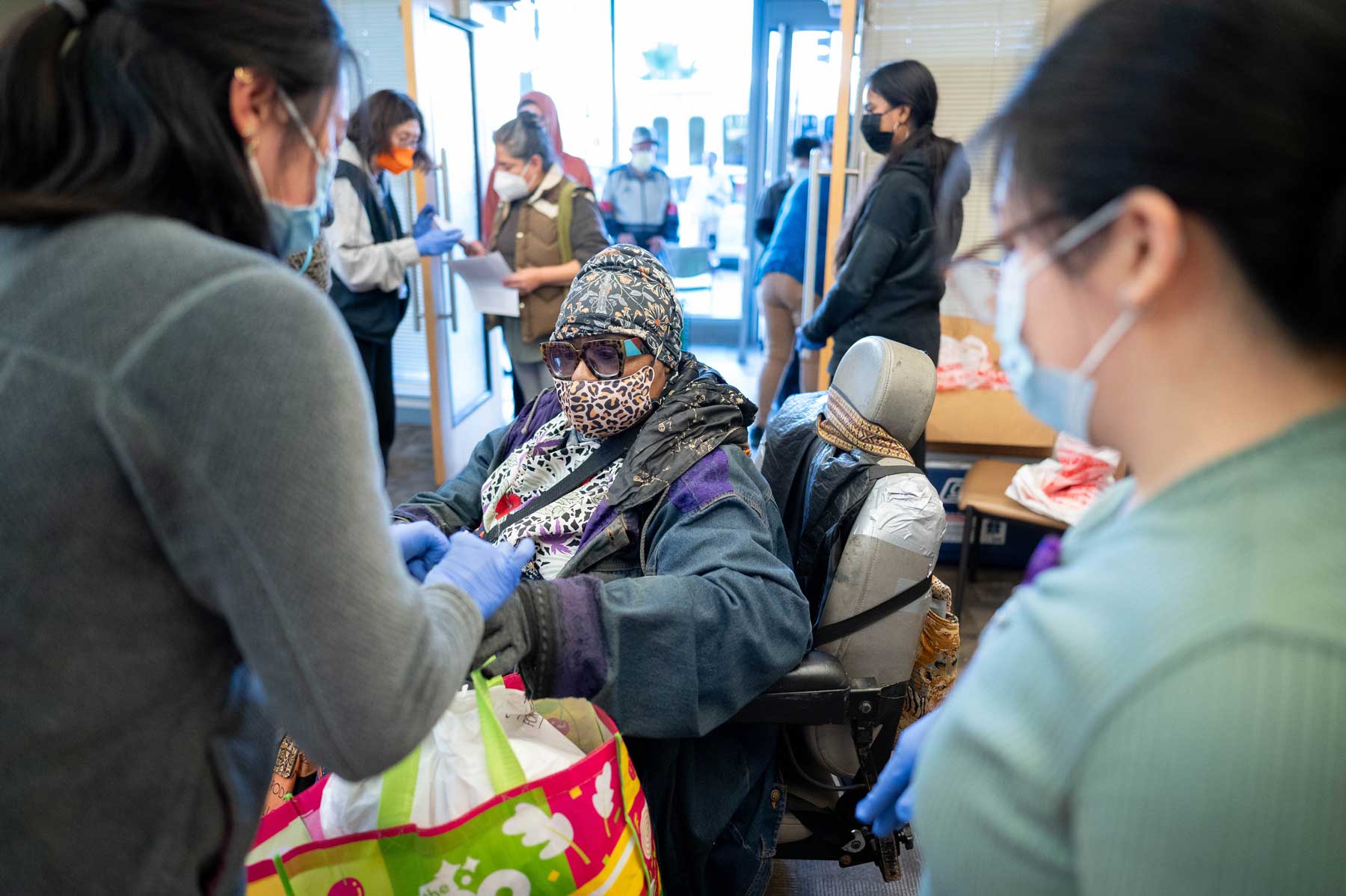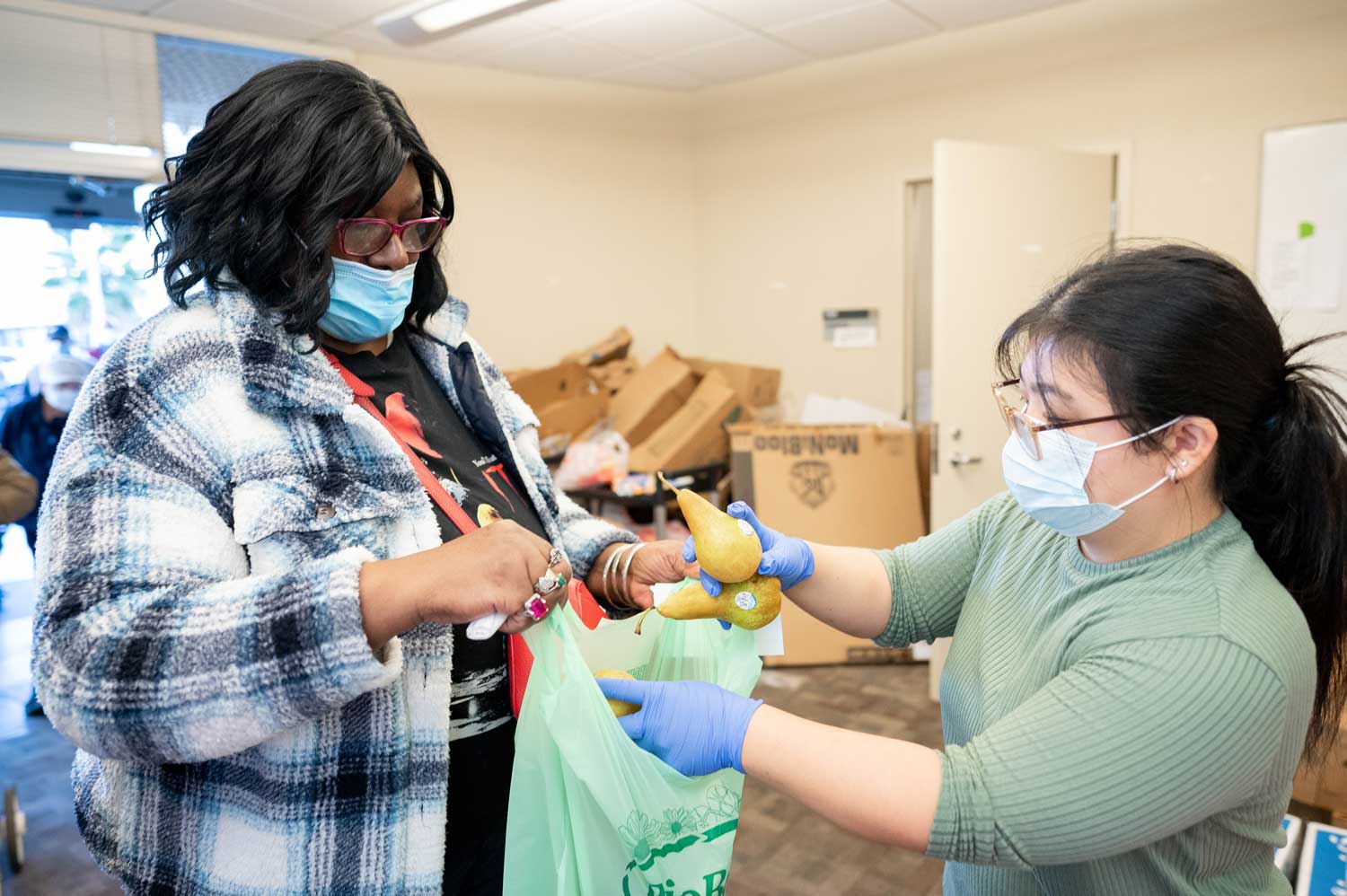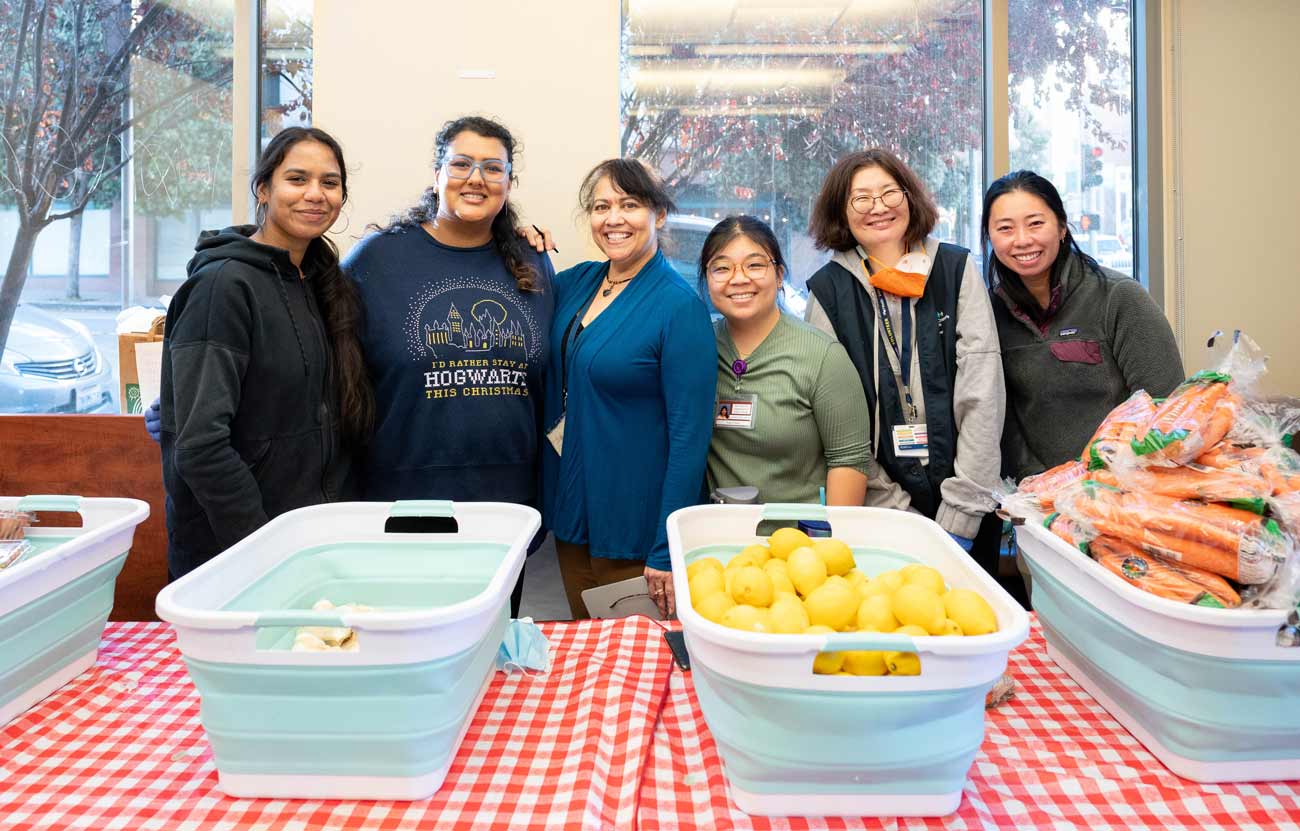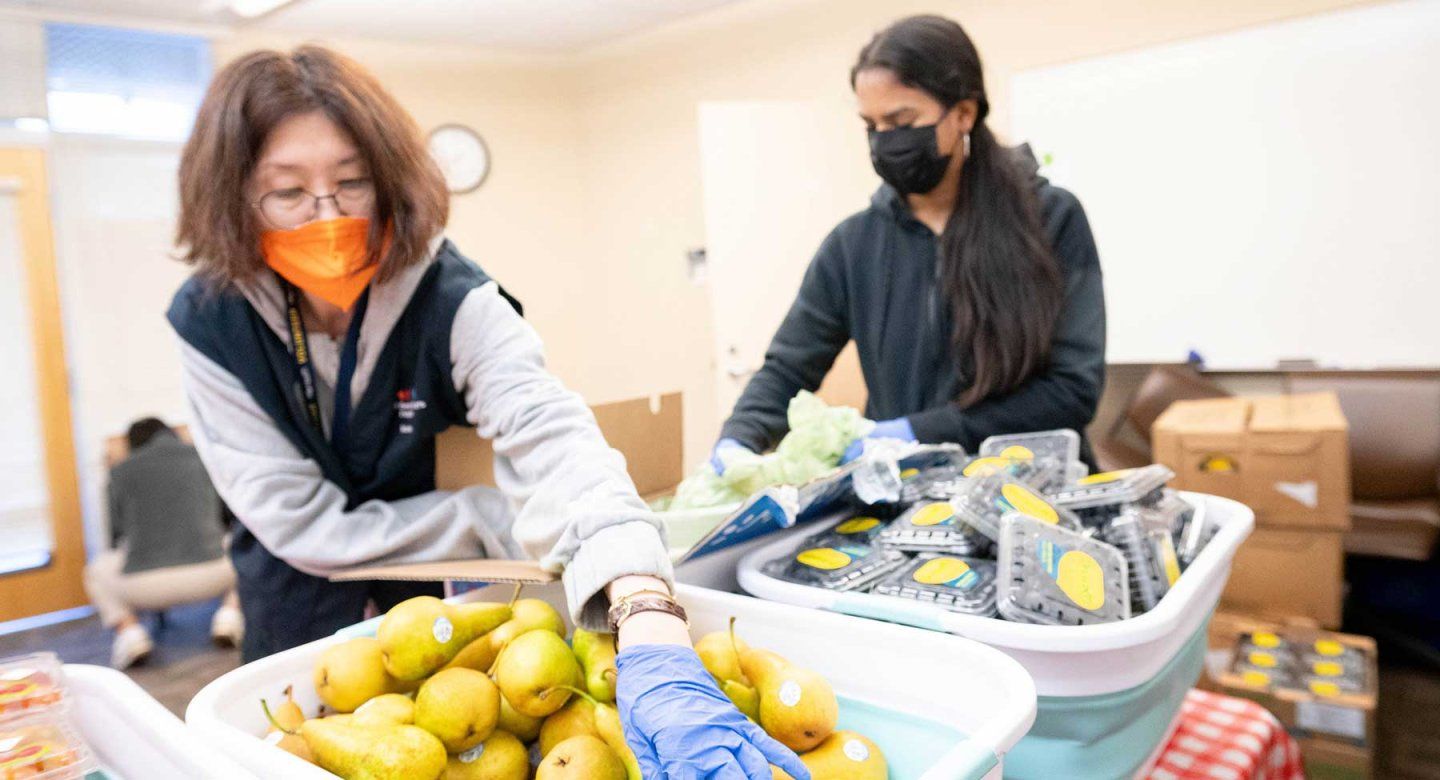For San Francisco patient Macheryl Franklin, the food pharmacy at UCSF Medical Center at Mount Zion has been nothing short of “a lifesaver.”
“It’s wonderful to have fresh fruits and vegetables; they are too expensive at the store,” said Franklin, as she rests her bag of groceries on the footstool of the wheelchair she’s used since a 2004 car crash injured her spine. “It’s a special treat when they have blueberries that I can put on my salads; they’re good for the brain.”
Blueberries were on offer this day in December, along with tomatoes, pears, carrots, lemons, garlic and a whole frozen chicken. As they packed bags for patients, volunteers and program lead Gina Moreno-John, MD, were talkative and upbeat, having learned their program just received a $3 million Hellman Foundation grant to expand to additional UCSF primary care locations in San Francisco over the next five years.
Begun in 2019, the UCSF Department of General Internal Medicine’s (DGIM) food pharmacy gives out bags of fresh produce and a protein item twice a month and offers a cooking class and hot meals once a month. It is the brainchild of Moreno-John and other physicians interested in social justice, after hearing about a colleague’s research that found high levels of food insecurity among patients. It was launched and sustained for years thanks to more than $250,000 in grants from the Mount Zion Health Fund.
“Nutritious food is critical for good health, but about 23% of our patients don’t have reliable access to sufficient nutrition – what we call being ‘food insecure,’” said Moreno-John. “Our patients tell us they regularly run out of food or can’t buy produce. Some tell us they have no money left over after they pay bills each month. Others only have $50 to $100 left over.”
Patients who run out of food down 49%
Currently, the DGIM clinic provides groceries to about 120 people at each event; other clinics provide food to five to 60 people per event. The new grant will enable Moreno-John, along with Program Manager Jennifer Fung, to expand food programming to six more primary care clinics in the city and enhance programming at the other five locations where it currently exists.
“Our patients tell us the program is not just helpful for their budget, but their brains feel sharper, their health has turned around and their spirits are lifted by being cared for in this way,” said Moreno-John. “And our research shows that the number of patients who often worry about running out of food has gone down by 36%, while the number of patients who often run out of food entirely has gone down by 49%.”


Centering patient needs
Each UCSF clinic’s food pharmacy is a little different by design, in order to meet the unique needs of its patient population. The Men of Color Program, which serves men who have or are at risk of HIV/AIDS, has an in-clinic Food Pharmacy and also offers home delivery of groceries to its patients who are homebound. These programs are run by Malcolm John, MD, and Jackie Marzan, MPH. At the student-run Clínica Martín-Baró in the Mission, which sees four to six Latinx patients on Saturday mornings, every patient receives a bag of groceries to take home at the end of a visit.
“For us, it’s much more important that patients get what they need rather than adhering to a particular way of doing things,” said Moreno-John.
Other UCSF clinics with existing food programs are the Women’s Health Primary Care Practice at Mount Zion, the Family Medicine Center at Lakeshore, and the Women’s HIV Program. New food programs will open in 2024 at the Primary Care China Basin Practice and the General Pediatric Practice at Mount Zion. There are future plans to start food programs at Laurel Village Primary Care practice and the Center for Geriatric Care, followed by two more student-run clinics that serve primarily Filipino and African-American patients.
The DGIM’s food pharmacy got off the ground with the help of San Francisco’s Food as Medicine Collaborative and the San Francisco-Marin Food Bank. The latter donated food to UCSF’s clinic until the pandemic, when their own resources became strained due to skyrocketing need.
“When I first started thinking about doing this in 2018, I did some online research, but it was talking to local food leaders in the Bay Area that really helped us get off the ground,” Moreno-John said. “Partnering with these community organizations has been invaluable.”
Collaborating with patients is equally important, she adds. The program has conducted several surveys and listens closely to feedback.
“We ask what kind of food people like and don’t like, how they feel about the program, and what other services they may need aside from food. We change what we offer and do accordingly,” said Moreno-John.
Based on patient feedback, Moreno-John and community partners are pulling together a list of other food programs in the Bay Area along with transportation services in the city, which she’ll then distribute to clinical colleagues to share with patients. Moreno-John is also advocating at the state legislature to support having Medi-Cal pay for the program’s food.
Join a cooking class
There’s continual collaboration among UCSF clinics as well. The Mount Zion pediatric resident food program started in 2021 when pediatric residents, under the mentorship of Joslyn Nolasco, MD, saw the activity across the street at the adult clinic, and asked Moreno-John if they could send their own patients over for food too.
“They did their own survey and found 1 in 5 of the patients’ families was food insecure,” said Moreno-John. “For now, it’s just the pediatric residents’ patients we can accept, but with this new funding the pediatric food leaders will start their own program soon.”
... On the day you give out the food or do the cooking lesson, you see people’s lives improve that very day.”
In 2023, Diana Thiara, MD, medical director of UCSF’s Weight Management Clinic, began offering a monthly Culinary Medicine class at the Mount Zion adult clinic and the Men of Color Program. The class includes cooking lessons using ingredients that the patients are given that day at the food pharmacy and lessons in nutrition.
“It’s pretty bootstrap, simple vegetarian stew or pasta recipes demonstrated on a portable stovetop in a conference room, but that’s better than a fancy teaching kitchen since a lot of under-resourced people don’t have that kind of setup,” Thiara said.
In the future, Thiara plans to make a website to post cooking and teaching videos, so patients can use it to make the recipes at home in their own time. She also wants to expand her classes to more clinics.
“What’s wonderful about participating in a program like this is that you see the impact immediately,” Thiara said. “It’s not theoretical; on the day you give out the food or do the cooking lesson, you see people’s lives improve that very day.”
Indeed, some patients are so inspired by the program, they elect to become volunteers, said Moreno-John.
“One of our patients who is food insecure comes every session to volunteer; she comes early and stays late,” Moreno-John said. “She says the work helps her feel connected, and that it makes her proud to do it.”

Centering patient needs
Each UCSF clinic’s food pharmacy is a little different by design, in order to meet the unique needs of its patient population. The Men of Color Program, which serves men who have or are at risk of HIV/AIDS, has an in-clinic Food Pharmacy and also offers home delivery of groceries to its patients who are homebound. These programs are run by Malcolm John, MD, and Jackie Marzan, MPH. At the student-run Clínica Martín-Baró in the Mission, which sees four to six Latinx patients on Saturday mornings, every patient receives a bag of groceries to take home at the end of a visit.
“For us, it’s much more important that patients get what they need rather than adhering to a particular way of doing things,” said Moreno-John.
Other UCSF clinics with existing food programs are the Women’s Health Primary Care Practice at Mount Zion, the Family Medicine Center at Lakeshore, and the Women’s HIV Program. New food programs will open in 2024 at the Primary Care China Basin Practice and the General Pediatric Practice at Mount Zion. There are future plans to start food programs at Laurel Village Primary Care practice and the Center for Geriatric Care, followed by two more student-run clinics that serve primarily Filipino and African-American patients.
The DGIM’s food pharmacy got off the ground with the help of San Francisco’s Food as Medicine Collaborative and the San Francisco-Marin Food Bank. The latter donated food to UCSF’s clinic until the pandemic, when their own resources became strained due to skyrocketing need.
“When I first started thinking about doing this in 2018, I did some online research, but it was talking to local food leaders in the Bay Area that really helped us get off the ground,” Moreno-John said. “Partnering with these community organizations has been invaluable.”
Collaborating with patients is equally important, she adds. The program has conducted several surveys and listens closely to feedback.
“We ask what kind of food people like and don’t like, how they feel about the program, and what other services they may need aside from food. We change what we offer and do accordingly,” said Moreno-John.
Based on patient feedback, Moreno-John and community partners are pulling together a list of other food programs in the Bay Area along with transportation services in the city, which she’ll then distribute to clinical colleagues to share with patients. Moreno-John is also advocating at the state legislature to support having Medi-Cal pay for the program’s food.
Join a cooking class
There’s continual collaboration among UCSF clinics as well. The Mount Zion pediatric resident food program started in 2021 when pediatric residents, under the mentorship of Joslyn Nolasco, MD, saw the activity across the street at the adult clinic, and asked Moreno-John if they could send their own patients over for food too.
“They did their own survey and found 1 in 5 of the patients’ families was food insecure,” said Moreno-John. “For now, it’s just the pediatric residents’ patients we can accept, but with this new funding the pediatric food leaders will start their own program soon.”
In 2023, Diana Thiara, MD, medical director of UCSF’s Weight Management Clinic, began offering a monthly Culinary Medicine class at the Mount Zion adult clinic and the Men of Color Program. The class includes cooking lessons using ingredients that the patients are given that day at the food pharmacy and lessons in nutrition.
“It’s pretty bootstrap, simple vegetarian stew or pasta recipes demonstrated on a portable stovetop in a conference room, but that’s better than a fancy teaching kitchen since a lot of under-resourced people don’t have that kind of setup,” Thiara said.
... On the day you give out the food or do the cooking lesson, you see people’s lives improve that very day.”
In the future, Thiara plans to make a website to post cooking and teaching videos, so patients can use it to make the recipes at home in their own time. She also wants to expand her classes to more clinics.
“What’s wonderful about participating in a program like this is that you see the impact immediately,” Thiara said. “It’s not theoretical; on the day you give out the food or do the cooking lesson, you see people’s lives improve that very day.”
Indeed, some patients are so inspired by the program, they elect to become volunteers, said Moreno-John.
“One of our patients who is food insecure comes every session to volunteer; she comes early and stays late,” Moreno-John said. “She says the work helps her feel connected, and that it makes her proud to do it.”

